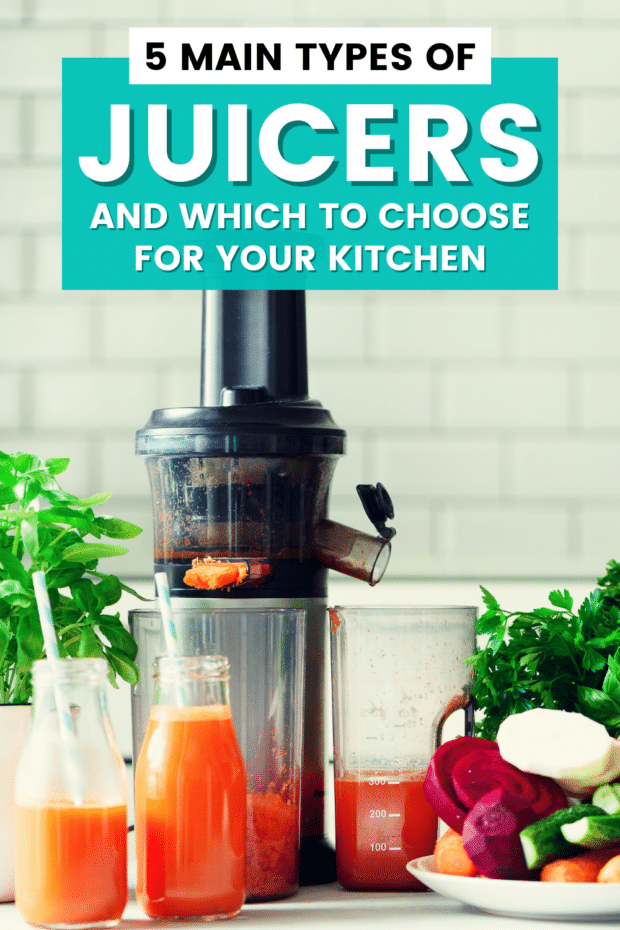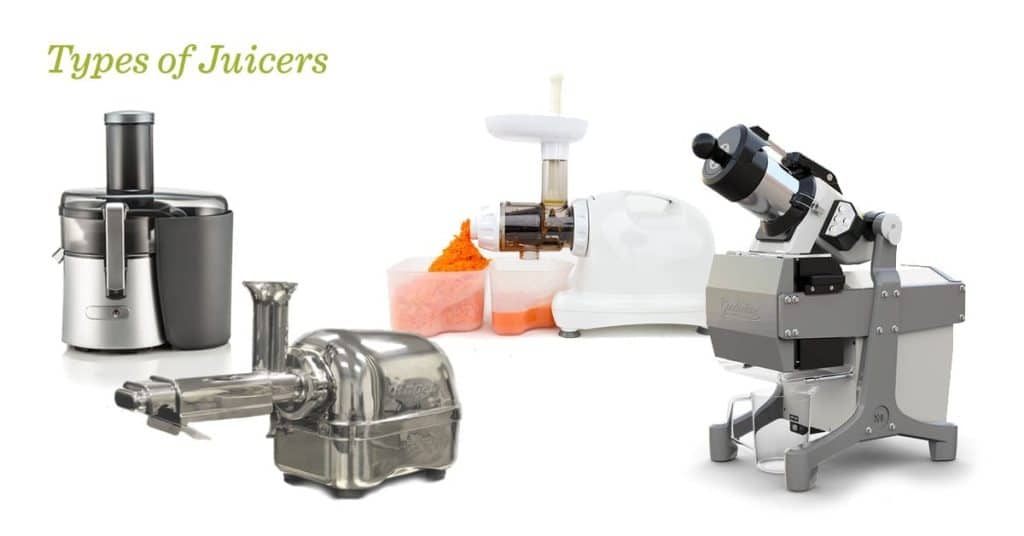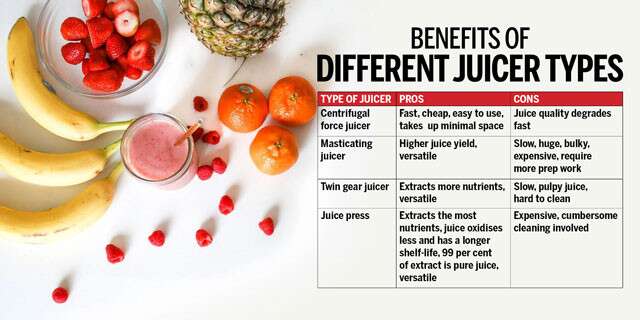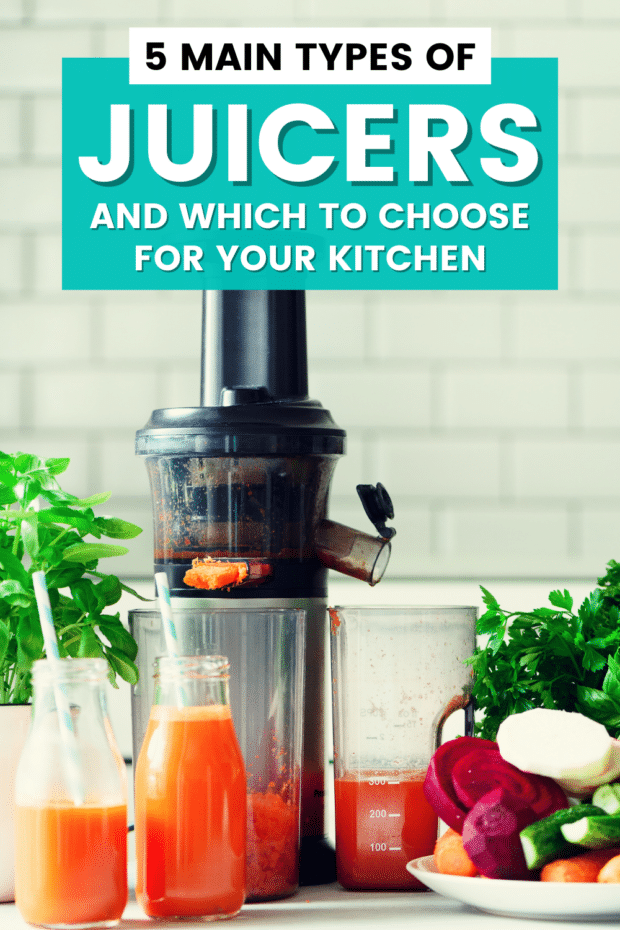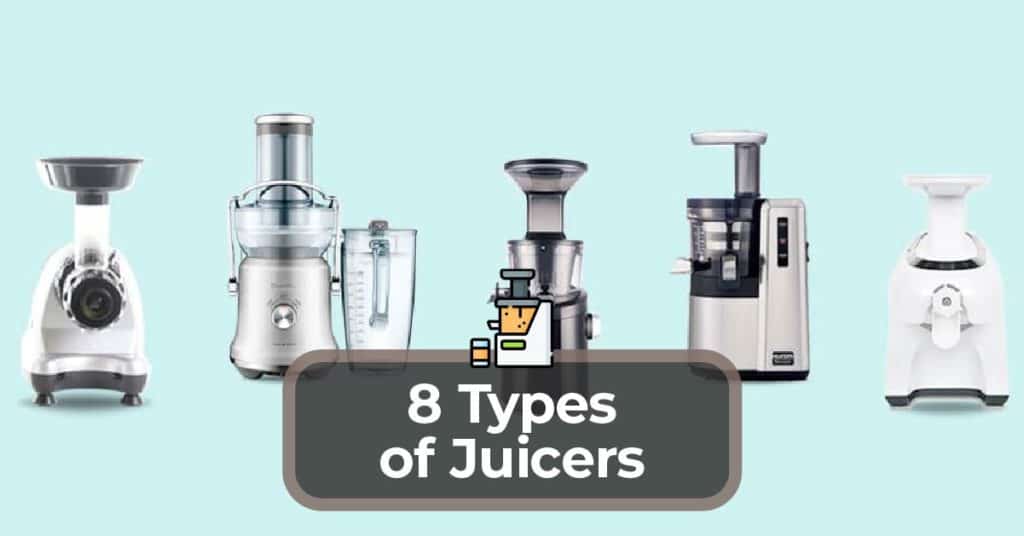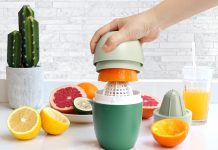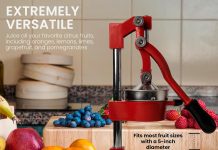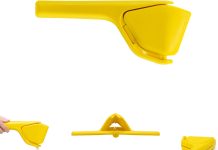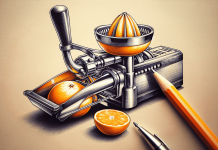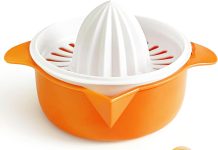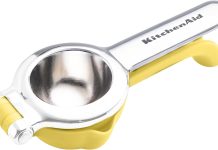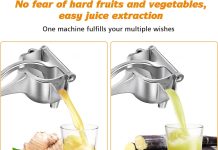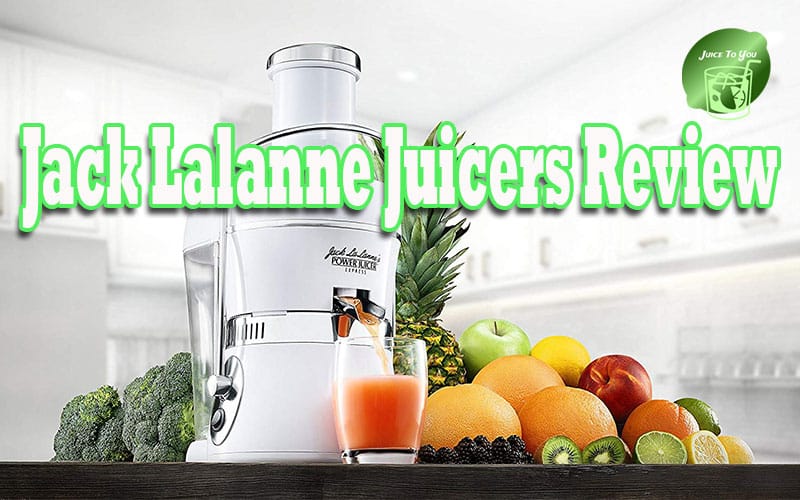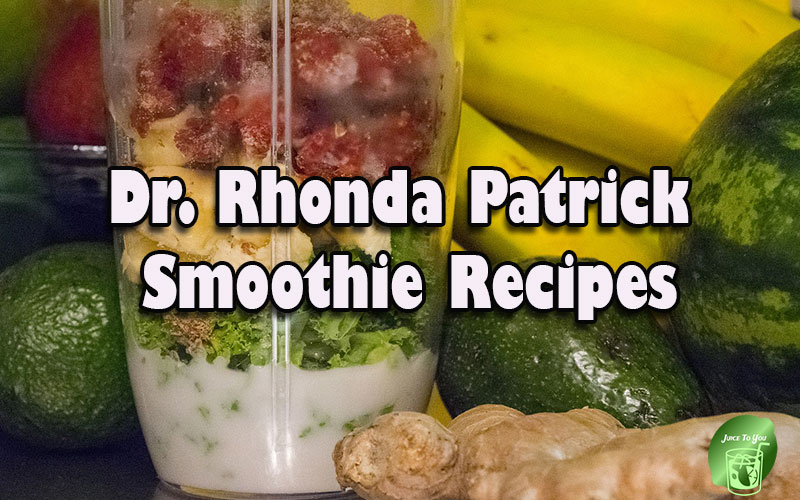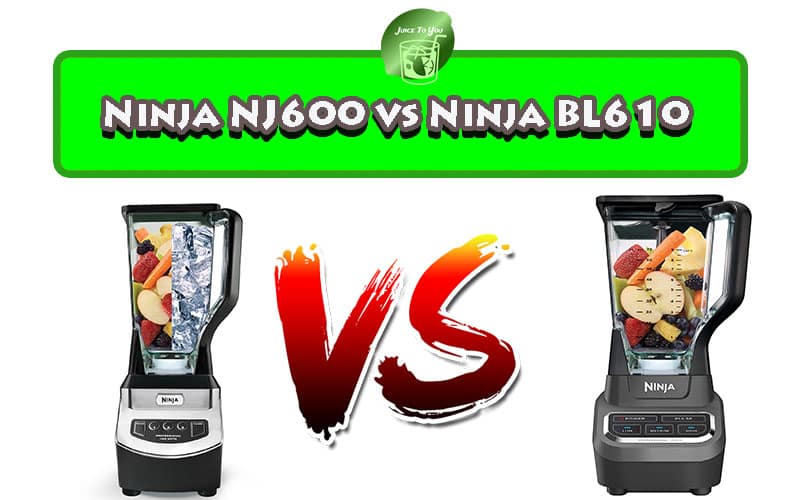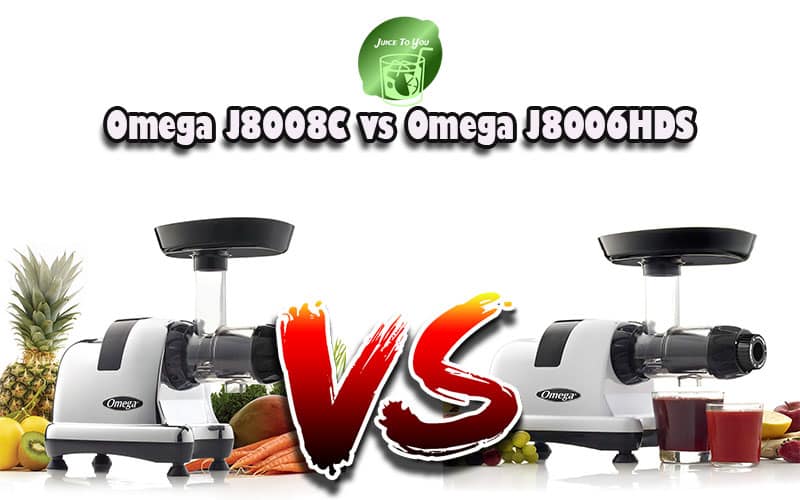Juicing has become increasingly popular as people strive for a healthier lifestyle, but navigating the world of juicers can be overwhelming.
With so many options available, it can be challenging to determine which type of juicer is the best fit for your needs.
In this article, we will explore the different types of juicers on the market, providing a brief overview of their features and benefits.
Whether you’re a juicing novice or a seasoned pro, this guide will help you decide on the juicer that suits you best.
Review contents
Centrifugal Juicers
Centrifugal juicers are popular for many juice enthusiasts due to their efficiency and convenience.
These juicers use a spinning blade to extract juice from fruits and vegetables. The fruits and vegetables are placed into a feed chute, and the spinning blade quickly slices and shreds them.
As the produce is shredded, the high-speed spinning motion creates centrifugal force, which pushes the juice through a mesh filter and into a separate container. At the same time, the pulp is collected in a different compartment.
Pros of using centrifugal juicers
One of the main advantages of centrifugal juicers is their speed. These juicers are incredibly efficient and can extract juice in seconds. This makes them perfect for those who are always on the go and don’t have much time to spare.
Additionally, most centrifugal juicers have wide feed chutes, so you can easily juice whole fruits and vegetables without pre-cutting, saving you even more time and effort.
Another pro of using centrifugal juicers is their affordability. Compared to other types of juicers, such as masticating or cold press juicers, centrifugal juicers tend to be more budget-friendly. A centrifugal juicer can be a great option if you’re starting your juicing journey or don’t want to invest in a high-end juicer.
Cons of using centrifugal juicers
While centrifugal juicers have their benefits, they also have drawbacks. One of the main downsides is their tendency to produce juice with a lower nutrient content than other juicers.
The high-speed spinning motion generates heat, which can lead to oxidation and the breakdown of some nutrients. If you’re looking to maximize the nutritional value of your juice, you may want to consider other juicer options.
Another con of using centrifugal juicers is their loud noise. The spinning blades and high-speed motor can create significant noise during operation. While this may not be a major issue for some, it can be unpleasant for those who prefer a quieter juicing experience.
Best centrifugal juicer options
Numerous centrifugal juicers are available on the market, each with its features and benefits. Some popular options include the Breville Juice Fountain Plus, the Hamilton Beach Big Mouth Juice Extractor, and the Mueller Austria Ultra Juicer Machine.
These juicers are known for their efficiency, durability, and affordability, making them excellent choices for those looking to incorporate juicing into their daily routine.
Masticating Juicers
Masticating juicers, also known as slow or cold press juicers, operate at a slower speed than centrifugal juicers. These juicers use a drill or a single gear to crush and grind the fruits and vegetables, extracting the juice gently and efficiently.
Pros of using masticating juicers
One of the significant advantages of masticating juicers is their ability to preserve the nutrients and enzymes in the juice. The slow grinding and crushing action minimizes heat and oxidation, resulting in a higher nutrient content than centrifugal juicers. If you’re looking to maximize the health benefits of your juice, a masticating juicer is a great choice.
Another pro of using masticating juicers is their versatility. These juicers are capable of juicing fruits and vegetables and can also handle leafy greens, wheatgrass, and even nuts. This versatility allows you to create juices and experiment with different flavors and combinations.
Cons of using masticating juicers
One of the main downsides of masticating juicers is their slower juicing time than centrifugal juicers. The slow grinding and crushing can take longer, especially when juicing larger quantities of produce. If you’re often in a rush or prefer a quick juicing process, a masticating juicer may not be your best option.
Another con of using masticating juicers is their higher price point. Compared to centrifugal juicers, masticating juicers tend to be more expensive. However, the superior nutrient retention and versatility of masticating juicers often justify this higher price.
Best masticating juicer options
When it comes to masticating juicers, there are several top-rated options. The Omega NC900HDC Juicer Extractor and Nutrition Center, the Tribest GSE-5050 Greenstar Elite Cold Press Juicer, and the Hurom H-AA Slow Juicer are highly recommended by juicing enthusiasts. These juicers are known for their exceptional quality, durability, and ease of use, making them a worthwhile investment for those committed to juicing.
Citrus Juicers
Citrus juicers are specifically designed to extract juice from fruits such as oranges, lemons, limes, and grapefruits. These juicers come in different styles, including manual and electric options, and are perfect for those who primarily enjoy citrus-based juices.
Pros of using citrus juicers
One of the significant advantages of citrus juicers is their simplicity and ease of use. Most citrus juicers have a basic design with a cone-shaped reamer or extraction mechanism.
All you need to do is cut the citrus fruit in half, place it on the reamer, and apply a little pressure to extract the juice. This makes citrus juicers perfect for beginners or those who prefer a hassle-free juicing experience.
Another pro of using citrus juicers is their efficiency in extracting citrus juice. These juicers are specifically designed to extract the maximum amount of juice from citrus fruits, leaving minimal pulp and waste. A citrus juicer is a must-have kitchen appliance if you’re a citrus lover and enjoy fresh-squeezed juice regularly.
Cons of using citrus juicers
While citrus juicers are great for extracting juice from citrus fruits, their functionality is limited compared to other juicers. If you enjoy a variety of juices that include non-citrus fruits and vegetables, a citrus juicer may not be the most versatile option. You may need to consider additional juicer types to cover your juicing needs.
Another con of using citrus juicers is their size and storage requirements. Electric citrus juicers, mainly, can be bulky and take up valuable counter space. If you have a small kitchen or limited storage area, you may need to consider the size and dimensions of the citrus juicer before purchasing.
Best citrus juicer options
Regarding citrus juicers, several options cater to different preferences and needs. The Cuisinart CCJ-500 Pulp Control Citrus Juicer, the Breville 800CPXL Die-Cast Stainless-Steel Motorized Citrus Press, and the Epica Powerful Stainless Steel Whisper-quiet Citrus Juicer-70 Watt motor are highly regarded by citrus juice enthusiasts. These juicers are known for their efficiency, durability, and ease of cleaning, making them excellent choices for those who love their daily dose of citrus juice.
Twin Gear Juicers
Twin gear juicers, known as triturating juicers, are the gold standard in juicing due to their exceptional juice quality and nutrient retention. These juicers work by using two interlocking gears, which rotate slowly to crush and grind the fruits and vegetables, extracting the juice gently and efficiently.
Pros of using twin-gear juicers
One of the main advantages of twin-gear juicers is their superior juice quality. The slow grinding and crushing action, coupled with the two gears, results in minimal heat and oxidation, preserving the nutrients and enzymes in the juice. If you’re all about the health benefits of juicing and want the highest quality juice possible, a twin-gear juicer is the way to go.
Another pro of using twin-gear juicers is their versatility. These juicers can handle a wide range of produce, including hard fruits and vegetables, leafy greens, wheatgrass, and more. The twin gears are designed to efficiently extract juice from various types of produce, allowing you to create a diverse range of juices to suit your taste and nutritional needs.
Cons of using twin-gear juicers
One of the main downsides of twin-gear juicers is their higher price point. These juicers tend to be more expensive than other types on the market. However, the investment is often worth it for those prioritizing the highest quality juice and nutrient retention.
Another con of using twin-gear juicers is their larger size and heavier weight. Twin-gear juicers are generally bulkier and heavier due to two gears and a more complex design. If you have limited counter space or need to move your juicer frequently, the size and weight of a twin-gear juicer may be a consideration.
Best twin-gear juicer options
A few models stand out for their exceptional performance and durability for twin-gear juicers. The Tribest GSE-5050 Greenstar Elite Cold Press Juicer, the Super Angel Premium Deluxe Juicer, and the Omega TWN30S Twin Gear Juicer are highly recommended by juicing enthusiasts. These juicers are known for their superior juice quality, versatility, and durability, making them top choices for those who want the best.
Cold Press Juicers
Cold press juicers, also known as slow or masticating juicers, operate at a lower speed than centrifugal juicers. These juicers use a drill or a single gear to crush and grind the fruits and vegetables, extracting the juice gently and efficiently.
Pros of using cold press juicers
One of the significant advantages of cold press juicers is their ability to preserve the nutrients and enzymes in the juice. The slow grinding and crushing action minimizes heat and oxidation, resulting in a higher nutrient content than centrifugal juicers. If you prioritize the nutritional value of your juice, a cold press juicer is an excellent choice.
Another pro of using cold press juicers is their versatility. These juicers are not limited to fruits and vegetables; they can also handle leafy greens, wheatgrass, and nuts. This versatility allows you to create various juices and experiment with different flavors and combinations to suit your taste preferences.
Cons of using cold press juicers
One of the main downsides of cold press juicers is their slower juicing time compared to centrifugal juicers. The slow grinding and crushing can take longer, especially when juicing larger quantities of produce. If you’re often in a rush or prefer a quick juicing process, a cold press juicer may not be your best option.
Another con of using cold press juicers is their higher price point. Compared to centrifugal juicers, cold press juicers tend to be more expensive. However, this higher price is often justified by the superior nutrient retention and versatility of cold press juicers.
Best cold press juicer options
When it comes to cold press juicers, there are several top-rated options available. The Omega NC900HDC Juicer Extractor and Nutrition Center, the Tribest GSE-5050 Greenstar Elite Cold Press Juicer, and the Hurom H-AA Slow Juicer are highly recommended by juicing enthusiasts. These juicers are known for their exceptional quality, durability, and ease of use, making them worth the investment for those who prioritize nutrient-rich juices.
Vertical Juicers
Vertical juicers, also known as upright juicers, are popular for those who value space-saving appliances and ease of use. These juicers have a vertical design, with the feed chute and pulp outlet at the top and bottom, respectively.
Pros of using vertical juicers
One of the main advantages of vertical juicers is their compact and space-saving design. Unlike other juicers that require a significant amount of counter space, vertical juicers have a smaller footprint, making them ideal for those with limited kitchen space. Additionally, the vertical design allows for more accessible storage as they can fit into tight spaces or cabinets.
Another pro of using vertical juicers is their convenience and ease of use. The vertical orientation of these juicers eliminates the need for a separate pulp container, as the pulp is automatically expelled into a collection bin at the bottom of the juicer. This eliminates the hassle of emptying a separate container and makes cleanup a breeze.
Cons of using vertical juicers
One of the main downsides of vertical juicers is their tendency to be slightly less efficient than horizontal juicers. The vertical design can sometimes clog or uneven juicing, mainly stringy fruits or vegetables. However, this is often a minor issue and can be resolved following the manufacturer’s recommendations and guidelines.
Another con of using vertical juicers is their price point. While not as expensive as other juicer types, vertical juicers tend to be slightly pricier than traditional centrifugal juicers. However, vertical juicers’ convenience and space-saving benefits often justify the slightly higher cost for many users.
Best vertical juicer options
There are several highly-rated vertical juicers available on the market. The Mueller Austria Ultra Juicer Machine, the Slowstar SW-2000 Juicer and Mincer, and the KOIOS Juicer Masticating Juicer Machine are well-received by juicing enthusiasts. These juicers are known for their efficiency, durability, and user-friendly design, making them excellent choices for space-saving and convenient juicing experiences.
Manual Juicers
As the name suggests, manual juicers require manual effort to extract juice from fruits and vegetables. These juicers come in various styles, such as hand-press, citrus presses, and manual wheatgrass juicers.
Pros of using manual juicers
One of the main advantages of manual juicers is their simplicity and portability. These juicers have a basic design and are usually compact, making them easy to use and carry around. They don’t require electricity, so you can use them anywhere, whether you’re camping, traveling, or don’t want to rely on electricity.
Another pro of using manual juicers is their affordability. Manual juicers are more budget-friendly than electric juicers, making them an excellent option for those on a tight budget or who want to try juicing without a significant financial commitment.
Cons of using manual juicers
One of the main downsides of manual juicers is the physical effort required. Extracting juice by hand can be time-consuming and labor-intensive, especially when juicing larger produce quantities. This may not be ideal for those who have limited strength or mobility.
Another con of using manual juicers is their limited functionality. Manual juicers are typically designed for specific types of produce, such as citrus fruits or wheatgrass. If you enjoy a variety of juices that include non-citrus fruits and vegetables, a manual juicer may not be the most versatile option.
Best manual juicer options
When it comes to manual juicers, there are several top-rated options available. The Zulay Professional Citrus Juicer, the Lexen GP27 Manual Wheatgrass Juicer, and the Visalia Citrus Press Juicer are highly recommended by juice enthusiasts. These juicers are known for their efficiency, durability, and ease of use, making them excellent choices for those who prefer manual juicers.
Electric Citrus Juicers
Electric citrus juicers are specifically designed to extract juice from citrus fruits such as oranges, lemons, limes, and grapefruits. These juicers are powered by electricity, simplifying the juicing process and reducing the effort required compared to manual juicers.
Pros of using electric citrus juicers
One of the main advantages of electric citrus juicers is their efficiency and convenience. These juicers can extract juice from citrus fruits with minimal effort, allowing you to enjoy fresh-squeezed juice in no time. The electric motor does the hard work for you, reducing the physical effort required.
Another pro of using electric citrus juicers is their versatility. These juicers often come with various attachments to accommodate different sizes of citrus fruits. Some models also have adjustable pulp control, allowing you to customize the pulpiness of your juice. This versatility allows you to juice various citrus fruits and experiment with different flavors.
Cons of using electric citrus juicers
One of the main downsides of electric citrus juicers is their limited functionality. These juicers are specifically designed for citrus fruits and may not be suitable for juicing non-citrus fruits or vegetables. If you enjoy a diverse range of juices, you may need to consider additional juicer types to cover your juicing needs.
Another con of using electric citrus juicers is their size and storage requirements. These juicers can be bulkier than manual citrus juicers, which can take up valuable counter space. If you have a small kitchen or limited storage area, you may need to consider the size and dimensions of the electric citrus juicer before purchasing.
Best electric citrus juicer options
There are several highly-regarded electric citrus juicers on the market. The Breville 800CPXL Die-Cast Stainless-Steel Motorized Citrus Press, the Cuisinart CCJ-500 Pulp Control Citrus Juicer, and the Eurolux Electric Orange Juicer are popular choices among citrus juice enthusiasts. These electric juicers are known for their efficiency, durability, and ease of use, making them excellent options for those who love their fresh citrus juice.
Auger Juicers
Auger juicers, known as single-gear juicers, operate slower than centrifugal ones. These juicers use a rotating drill or spiral gear to crush and grind the fruits and vegetables, extracting the juice gently and efficiently.
Pros of using auger juicers
One of the significant advantages of auger juicers is their ability to extract a high juice yield. The slow grinding and crushing action, coupled with the rotating drill, efficiently squeezes out every drop of juice from the produce. This results in a higher juice yield compared to centrifugal juicers, making auger juicers a cost-effective option in the long run.
Another pro of using auger juicers is their ability to handle a variety of produce. These juicers are not limited to fruits and vegetables; they can also handle leafy greens, wheatgrass, and nuts. This versatility allows you to create juices and experiment with different flavors and combinations.
Cons of using auger juicers
One of the main downsides of auger juicers is their slower juicing time than centrifugal juicers. The slow grinding and crushing can take longer, especially when juicing larger quantities of produce. If you’re often in a rush or prefer a quick juicing process, an auger juicer may not be your best option.
Another con of using auger juicers is their higher price point. Compared to centrifugal juicers, auger juicers tend to be more expensive. However, the higher price is often justified by auger juicers’ superior juice yield and versatility.
Best auger juicer options
There are several top-rated auger juicers available on the market. The Omega NC900HDC Juicer Extractor and Nutrition Center, the Tribest GSE-5050 Greenstar Elite Cold Press Juicer, and the Aicok Slow Masticating Juicer are highly recommended by juicing enthusiasts. These juicers are known for their exceptional juice quality, durability, and ease of use, making them excellent choices for those seeking a versatile and efficient juicing experience.
Whole Fruit Juicers
Whole fruit juicers, also known as wide-mouth or feed chute juicers, are designed to accommodate whole fruits and vegetables without pre-cutting. These juicers have a wide feed chute that can handle larger pieces of produce, making the juicing process quicker and more convenient.
Pros of using whole fruit juicers
One of the main advantages of whole fruit juicers is their time-saving feature. The wide feed chute lets you juice whole fruits and vegetables without pre-cutting, significantly reducing prep time. This is especially beneficial for those who are always on the go and need a quick and convenient juicing solution.
Another pro of using whole fruit juicers is their versatility. These juicers can handle a wide range of produce, including hard fruits and vegetables, leafy greens, and nuts. The wide feed chute and powerful motor allow for efficient juicing of different types of produce, giving you the flexibility to create various juices to suit your preferences.
Cons of using whole fruit juicers
One of the main downsides of whole fruit juicers is their larger size and weight. Due to a wide feed chute and a powerful motor, these juicers can be bulkier than other types of juicers. If you have limited counter space or need to move your juicer frequently, the size and weight of a whole fruit juicer may be a consideration.
Another con of using whole fruit juicers is their higher price point than some centrifugal juicers. The wide-fed chute and powerful motor often come at a higher cost. However, whole fruit juicers’ convenience and time-saving benefits often outweigh the higher price for many users.
Best whole fruit juicer options
There are several highly-regarded whole fruit juicers available on the market. The Breville JE98XL Juice Fountain Plus, the Hamilton Beach Big Mouth Juice Extractor, and the Mueller Austria Ultra Juicer Machine are popular among juicing enthusiasts. These juicers are known for their efficiency, durability, and versatility, making them excellent options for those who prioritize time-saving and convenient juicing.
In conclusion, there is a wide variety of juicers, each with its features and benefits. Choosing the right juicer depends on your preferences, budget, and juicing needs.
Whether you opt for a centrifugal juicer for its speed and affordability, a masticating juicer for its nutrient retention and versatility, or a citrus juicer for your love of citrus fruits, there is a juicer out there to suit your juicing journey.
Explore the different options and consider the pros and cons of each type to find the perfect juicer for your needs. Happy juicing!

